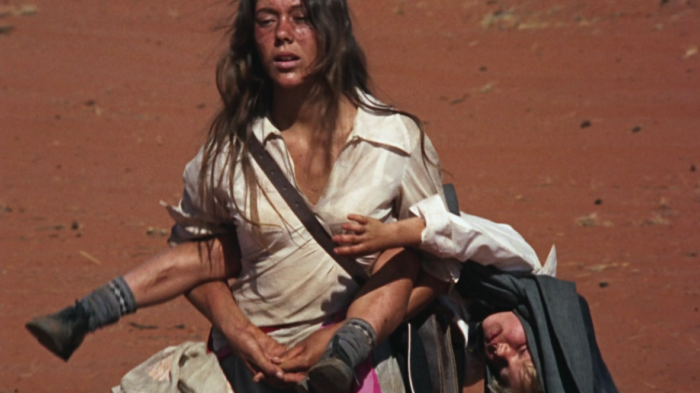
We sure do love Australia here at Mildly Pleased. So much so that not only have we covered every Australian-produced film in the Criterion Collection (there are only four), but we’re now onto British films made in Australia. Yes, to my surprise, Walkabout, which I always assumed was as Australian as a kangaroo playing a didgeridoo, is actually a British film made by British people, based on a British book, and starring two British children. So, Walkabout isn’t a film about Australia as much as it is a film about an outsider’s perspective of Australia. However, it’s precisely this perspective that makes the film stand out.
We’ve covered three Nicolas Roeg films on this site, and it’s worth noting that each time, a different person has reviewed one of his films. I think this goes to show that Roeg was a diverse filmmaker who made films for many sensibilities. Roeg dabbled in horror, sci-fi, comedy, family films, adventure films—whatever he found interesting. It’s also worth mentioning that Roeg began his career as a cinematographer, which is why all of his films are particularly scenic. Roeg even served as his own cinematographer on Walkabout, and the results showcase a man who truly had an eye for nature.
Walkabout tells the story of Girl (Jenny Agutter) and White Boy (Luc Roeg, son of Nicolas Roeg)—yeah, it’s one of those movies where nobody has names—joining their Father (John Meillon) for a picnic in the heart of the Australian outback. Except, it’s not for a picnic; it’s an isolated location where the Father plans to shoot the children and then himself. His reasons are never entirely clear, but I find that mystery compelling. Why should we know his motivation? It’s not like the children know. So let’s put ourselves in the children’s shoes.
Girl and White Boy manage to escape, only for Father to take his own life and burn down their car anyway, leaving the pair stranded with limited resources and survival skills. My ’90s kid brain immediately drew a line to Gary Paulsen’s 1987 young-adult novel, Hatchet. Walkabout was also based on a young-adult novel from 1959, but unlike Hatchet, these kids aren’t as adept at survival.
Girl takes on the guardian role, being 17 (White Boy is about 9), and though she does everything she can to keep White Boy calm and safe, she is just as clueless about what to do. The pair are spared from the harsh terrain when they discover an oasis with plants and water, but even that dries up by the next day.
Just as all hope seems to fade away, an Aboriginal Boy (David Gulpilil) arrives at the oasis and shows the siblings how to draw water from the remains of the oasis. The Aboriginal Boy allows the siblings to join him as he continues his “walkabout”—a tradition in Australian Aboriginal culture where an adolescent boy must learn to survive in the wild for a period as long as six months—and the trio sets out.
Much of the actual filming of Walkabout was improvised by the cast and crew while scouting locations deep in the outback. Perhaps the most notable sequence is when Girl goes swimming nude (wait, how old is she?) in a scene intercut with the Aboriginal Boy hunting numerous animals. It’s a montage that displays both the beauty and violence of the Outback, heightened by John Barry’s romantic score.
The story delves into complicated interpersonal dynamics between the Girl and the Aboriginal Boy as the journey progresses. I don’t want to spoil the ending, but their inability to communicate leads to a poignant but bittersweet finale. I’m still thinking about it, so much so that I’m bumping my rating up half a star after docking it for all the scenes of animals being hunted (which I understand are necessary for the story).
Apart from being a coming-of-age film for the Girl and the Aboriginal Boy, Walkabout also explores the white people’s need to conquer the outback. One of the most memorable scenes in the film is when the Aboriginal boy is trying to hunt, only for white hunters in jeeps to show up and poach his prey. The Aboriginal Boy has become a stranger in his own home and continually feels like an outsider throughout the film.
The film ends on a wistful note. The Girl looks back at her time in the outback as a period of freedom she’ll likely never experience again. It’s an ending that lingers with you, almost hauntingly. Maybe that’s what Nicolas Roeg is good at? He certainly accomplished that in Don’t Look Now, though not so much in The Witches, but that one’s not in the Criterion Collection… yet.


